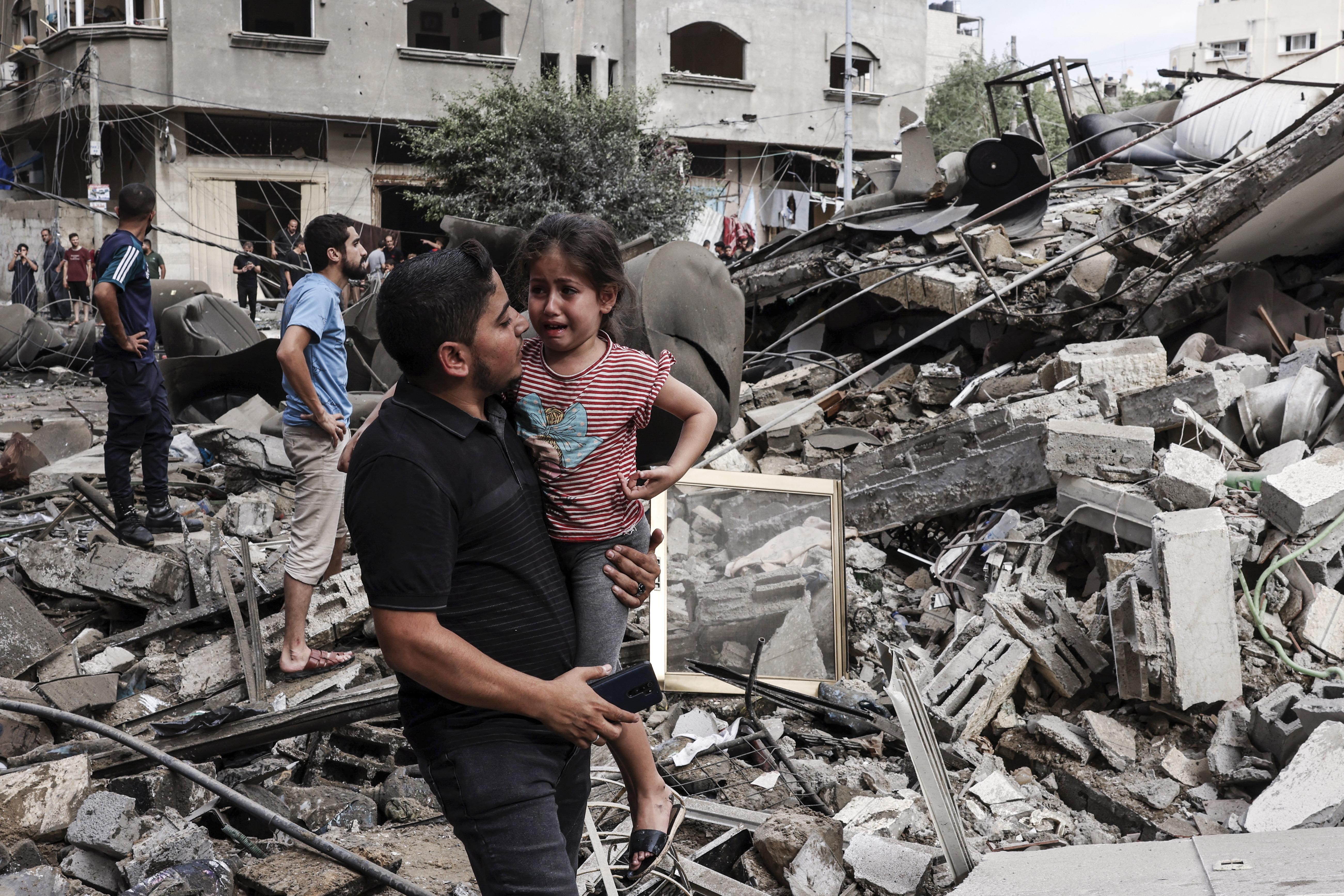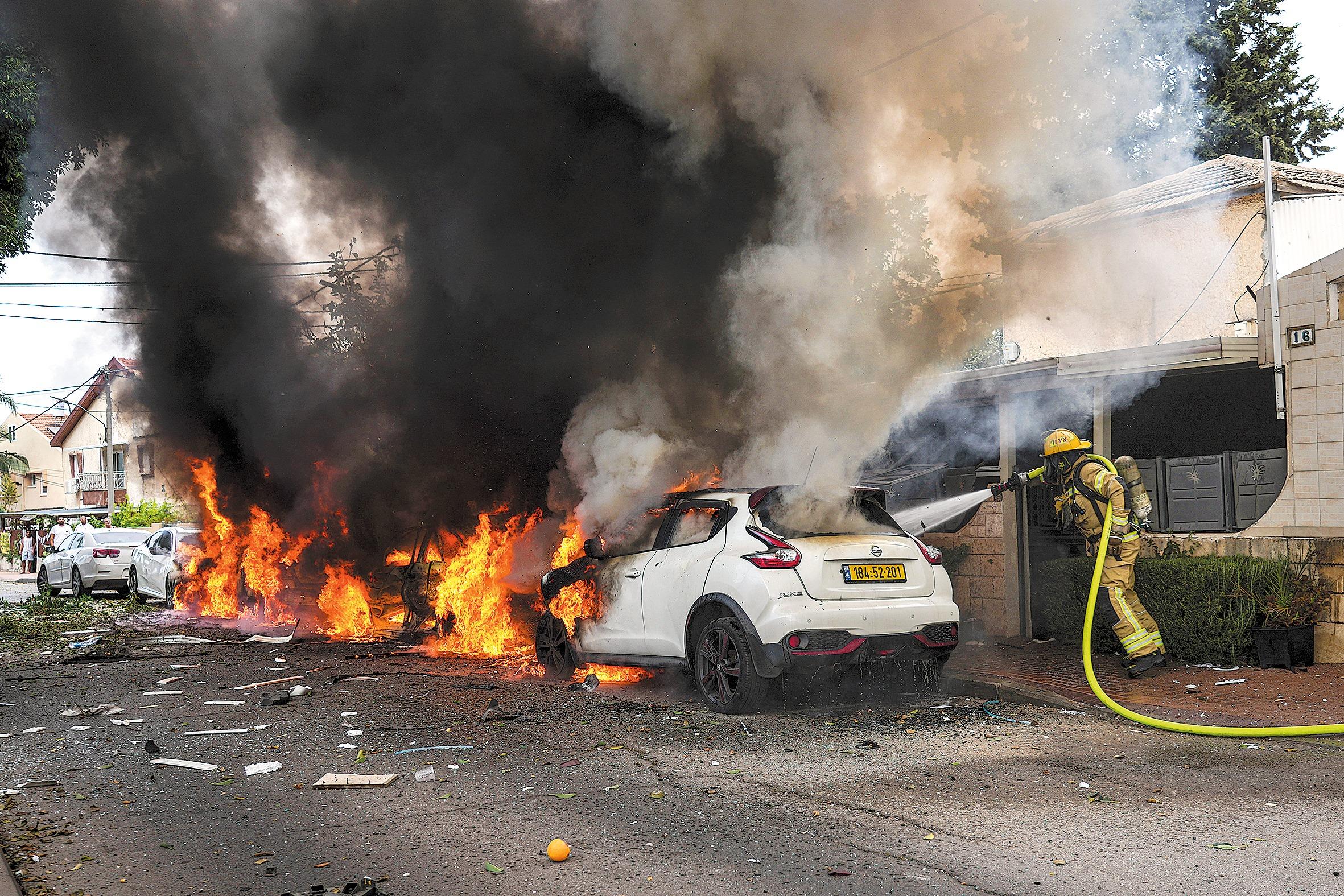Beijing, Cairo among growing voices urging end to violence as Israel retaliates after Hamas attack
 A man carries a crying child as he walks in front of a building destroyed in an Israeli air strike in Gaza City on October 7, 2023. (PHOTO / AFP)
A man carries a crying child as he walks in front of a building destroyed in an Israeli air strike in Gaza City on October 7, 2023. (PHOTO / AFP)
Appeals for a cease-fire and minimizing civilian suffering grew louder around the world as Israel imposed a total siege on Gaza following a surprise Hamas assault on the Jewish state on Oct 7.
More than 2,100 Israelis and Palestinians, as well as several foreign nationals, had died in the conflict as of Oct 11, according to the Israeli military and Palestinian authorities.
In Beijing, Foreign Ministry spokesman Wang Wenbin said that China was trying to verify and confirm information on reported Chinese casualties in the conflict. He was responding to a report that two Chinese workers were killed in Sderot near the Gaza border.
Also on Oct 10, China’s Special Envoy on the Middle East Issue Zhai Jun called for an immediate cease-fire, saying that China opposes and condemns acts that harm civilians.
In a phone conversation with Osama Khedr, assistant minister of the Egyptian Ministry of Foreign Affairs’ Palestine Department, Zhai said that China would like to maintain communication and coordination with Egypt to push for an end to the violence between Palestine and Israel.
Beijing is willing to work with Cairo to prod the international community to jointly provide humanitarian support to the Palestinian people and prevent the exacerbation of the humanitarian crisis in Palestine, especially in Gaza, he said.
Khedr expressed appreciation for China’s fair stance on the Palestinian issue, saying that Egypt looks forward to working with China to make efforts to de-escalate the situation.
The Arab League and the Russian Federation also called for negotiations and an end to “hostilities” between Israel and Palestine. Ahmed Aboul-Gheit, secretary-general of the Arab League, flew to Moscow following Hamas’ attacks to discuss the situation.
The Hamas assault occurred around the 50th anniversary of the October 1973 war, when Israel was attacked on one of the holiest days on the Jewish calendar.
After getting caught off guard, the Israeli army responded fast and launched extensive airstrikes on targets in Gaza while moving to clear off Hamas militants from positions.
Senior Hamas official Moussa Abu Marzouk told Al Jazeera in a phone interview that the group was open to “all political dialogues” when asked about a possible truce with Israel, Russian news agency TASS and Reuters reported on Oct 10.
However, Hamas’ military wing spokesman Abu Obeida was cited by Xinhua News Agency as warning in an audio statement that any targeting of Palestinian people and their homes would be regrettably met with the execution of Israeli civilian hostages.
 A firefighter extinguishes a burning car on Oct 9 in Ashkelon, southern Israel, that was set ablaze by a rocket fired from Gaza. (PHOTO / AP)
A firefighter extinguishes a burning car on Oct 9 in Ashkelon, southern Israel, that was set ablaze by a rocket fired from Gaza. (PHOTO / AP)
Israel said that Hamas and other militant groups in Gaza were holding more than 150 soldiers and civilians hostage, the Associated Press reported.
Cease-fire appeals were amplified after Israeli Defense Minister Yoav Gallant ordered on Oct 9 a “complete siege” on Gaza, a day after Israeli Prime Minister Benjamin Netanyahu declared war against Hamas and vowed “mighty vengeance”.
“What Hamas will experience will be difficult and terrible ... we are going to change the Middle East,” Netanyahu told officials visiting Jerusalem.
Gallant, during his briefing with top Israeli military officials, said that the blockade on Gaza, home to about 2.3 million people, covered cuts to electricity, food, and fuel supplies.
The conflict was expected to escalate further as Israel expanded the mobilization of reservists to 360,000 on Oct 10, according to media reports.
Palestinian President Mahmoud Abbas emphasized, during a phone call with United Nations Secretary-General Antonio Guterres, the importance of delivering relief and medical aid to Gaza residents to prevent a “humanitarian catastrophe”.
Guterres said the UN is working to provide urgent humanitarian relief to the residents of Gaza.
The Organization of Islamic Cooperation (OIC) said Israel’s failure to adhere to the resolutions of international legitimacy and its “attacks and daily crimes against the Palestinian people, their land and sanctities” are behind the instability in the region.
The Jeddah-based OIC comprises 57 member states, 48 of which are Muslim-majority countries.
Indonesia, the world’s most populous Muslim-majority country, said Israel’s occupation of Palestinian territories is the “root of the conflict”.
Malaysia’s foreign ministry said: “Palestinians have the legal right to live in a state of peace within own internationally-recognized borders, based on pre-1967 borders, with East Jerusalem as (the) capital,” while also noting the people’s “inalienable right to return to their homes and property from which they have been displaced”.
Julkipli Wadi, dean of the Institute of Islamic Studies at the University of the Philippines, said that it is “exceedingly surprising” that Israel failed to anticipate the attack. But on the other hand, he said this is “emblematic of an unwavering will of oppressed peoples that would do everything to break apartheid walls (no matter) how high they may be”.
Mehmood Ul Hassan Khan, executive director of the Center for South Asia and International Studies (CSAIS) in Islamabad, said the escalation of the conflict would be a disaster for humanity, and that it is the Palestinians who are suffering most from the clashes.
“It would also derail and delay the process of greater normalization in the Middle East, hindering socio-economic prosperity and connectivity in the region,” he said.
In New York, the UN Security Council was on Oct 8 urged to push for the two-state solution to the Palestine-Israel conflict with a sense of urgency.
Saddened by the numerous civilian casualties, Zhang Jun, China’s permanent representative to the UN, called for urgent efforts to work for a two-state solution in which an independent State of Palestine coexists with Israel.
It should be pointed out that the root cause of the Middle East crisis is that the peace process has deviated from the right tracks, with constant erosion into the basis of the two-state solution and little adequate implementation of related UN resolutions, Zhang told the meeting.
China has rightly called for a “two-state solution” to end the crisis and demanded complete de-escalation, said Khan, from CSAIS. “Right from the beginning, the Chinese leadership emphasized … dialogue, diplomacy … to resolve this frozen conflict.”
Imtiaz Gul, executive director of the Center for Research and Security Studies in Pakistan, said the Chinese policy in regard to the Palestine issue has been very admirable, and that Beijing remains committed to a peaceful resolution to the conflict.
China has made it clear that it does not want to interfere in the internal matters of any country, but it also desires an equitable, just resolution to all the problems including those of the Palestinians who deserve an independent sovereign state.
“I think in that context, China basically stands out, along with a number of other countries who have been advocating for a free, independent Palestinian state,” Gul noted.
Xinhua contributed to this story.
Contact the writers at jan@chinadailyapac.com


